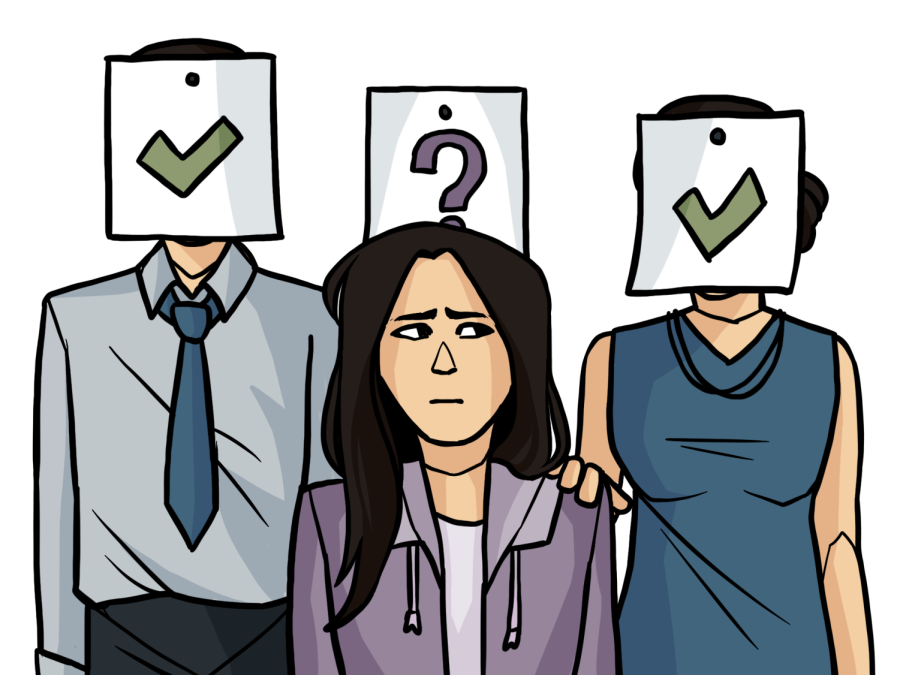FOCUS: Asian Americans discuss how generational expectations impact their wellbeing
The Bay Area is home to a vibrant and diverse Asian American community, which is reflected in SCHS’s staff and student population. Many Asian American members of the SCHS community have had the unique experience of being in an academic environment while navigating their own mental health.
When English teacher Maichen Liu-Grossman and her family moved from Davis, California to Canada, she recalled being placed in English Language Development classes because she came from a bilingual household, despite her ability to fluently speak English. Being an educator, Liu-Grossman hopes to create inclusive environments for all students, regardless of their backgrounds.
“Being alienated by the school system in many ways and the assumptions about my language is something I always carried with me,” Liu-Grossman said. “Now as a teacher, I want to make the classroom, especially the English classroom, a place where students can feel comfortable. I want them to be able to explore ideas and develop their voices as writers.”
Many Asian American high schoolers today struggle with meeting their family’s expectations when it comes to careers. Liu-Grossman’s decision to pursue English was initially met with disapproval from her parents.
“When I applied to college, my dad was like, ‘So you’re gonna do biochemistry?’ because he was a biochemistry major. When I said, ‘No, I think I’m gonna do English,’ he was like, ‘What? You won’t be able to get a job,’” Liu-Grossman said.
Similarly, science teacher Saheed Mohamed originally pursued a career in the medical field, primarily due to his parents’ expectations. By his third year of college, he began to volunteer in emergency rooms and discovered the reality of the career was different from what he imagined.
“It’s not all action like you see in the shows,” Mohamed said. “For various reasons, I realized that career wasn’t for me. I didn’t want to become a doctor because I couldn’t see myself in that life.”
Looking back at her younger self, Liu-Grossman sees her students undergoing similar struggles she did when she grew up, and she does not want her students to feel discouraged the way she did.
“It was tough,” Liu-Grossman said. “When they are telling you, ‘You are going down the wrong path,’ it takes some of the joy out of what you want to do.”
Many expectations and goals stem from generational trauma and cycles. Senior Arwen Hirsch urged people to break the cycle and do what makes them happy.
“A lot of it is generational,” Hirsch said. “If we learn now, we don’t have to be the Asian parents that carry that cycle to our kids.”
For Hirsch, her mother was the one to break the generational cycle, inspiring Hirsch to become more comfortable around talking about mental health.
“Growing up, my mom didn’t see a lot of conversation around mental health, so she got into the psychology field herself,” Hirsch said. “I am glad my mom went into the field and made an effort to do that, which helped me get even more exposure to mental health.”
Hirsch’s mother’s career in psychology also inspired Hirsch to get involved with Bring Change to Mind Peer Helpers, serving as co-president for her senior year. Through BC2M, Hirsch hopes to create more open conversations among students when it comes to mental health.
“Starting from a young age, we need to normalize conversations on these issues so people can know that there are resources like Peer Helpers where students can help students,” Hirsch said.
As a parent himself, Mohamed strives to be as present as possible for his son, whether it be supporting his passions, or watching his sports games.
“It’s a generational thing. Everyone wants what they couldn’t have,” Mohamed said. “I played sports, and my parents couldn’t go to my games. Now, I’m able to go to every single one of my son’s basketball games, lacrosse games, whatever games he’s playing.”
Liu-Grossman’s daughter was a 2018 SCHS graduate. She recalled situations where she was careful not to pressure her daughter the way her own parents did to her.
“I put a lot of pressure on her to take on certain courses, but I had to catch myself a lot of the time because I didn’t want to become my own parents as I wanted to let her do what she wanted to do,” Liu Grossman said.
According to Mohamed, the most important thing high schoolers have right now is time. He urged students to advocate for themselves right now, rather than letting expectations build up even more as they grow older.
“I think it’s more important to be happy than to have money,” Mohamed said. “If you have to argue with your parents to do something you’re passionate about, then do what you’re passionate about. Your parents may not like it, but if it’s gonna happen eventually, it might as well happen now than when you are 30 or 40 years old.”


